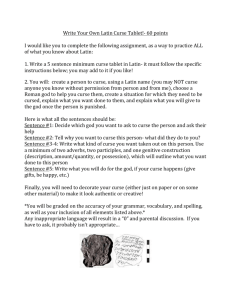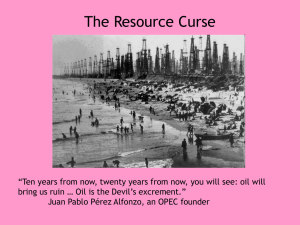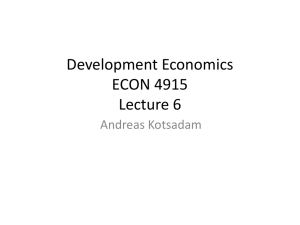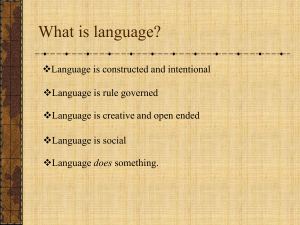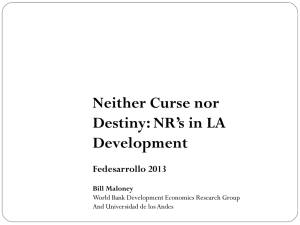The Resource Curse
advertisement
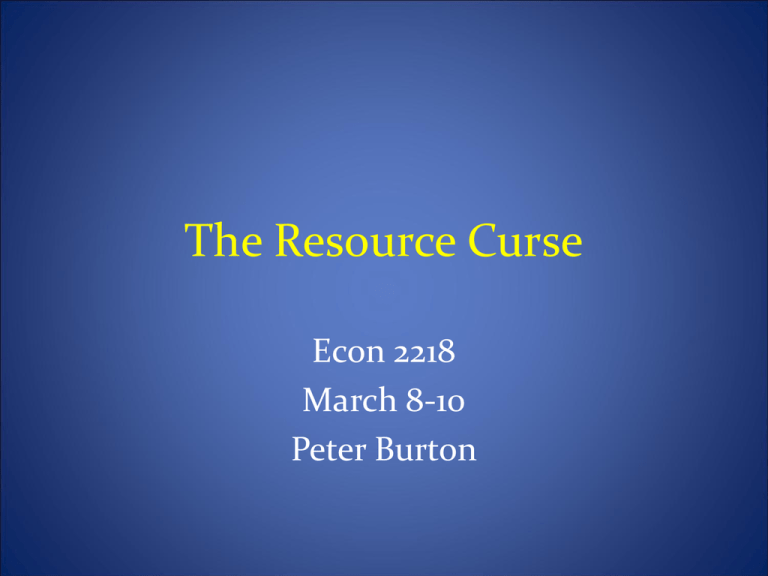
The Resource Curse Econ 2218 March 8-10 Peter Burton The Resource Curse (The Paradox of Plenty) Countries and regions with an abundance of natural resource, especially concentrated resources such as minerals and fossil fuels, tend to have lower economic growth and worse development outcomes The Resource Curse The Resource Curse The Resource Curse “Ten years from now, twenty years from now, you will see: Oil will bring us ruin...oil is the Devil’s excrement.” Juan Pablo Perez Alfonzo (Venezuelan politician), 1973 The Resource Curse Original References: Auty, R. (1990), Resource-Based Industrialization: Sowing the Oil in Eight Developing Countries, Oxford U. Press Gelb, A. (1988), Windfall Gains: Blessing or Curse? , Oxford U. Press Good Summary: Sachs, J and A. Warner (2001), The curse of natural resources, European Economic Review 45, 827-838 The Resource Curse Possible Reasons: 1) 2) 3) 4) 5) 6) 7) 8) Conflict Responsible Government Exchange Rate Appreciation (Dutch Disease) Revenue Volatility Excessive Debt Corruption Specialization Reduced Education The Resource Curse Counterargument: Association could have reverse causation: Conflicts and bad policies may discourage all other economic activity before it stops resource extraction and export The Resource Curse Possible Reasons: 1) Conflict: a) Jurisdictional fights over the control of resources/revenues b) Armed conflict over resources c) Resource revenues may fund other conflicts (e.g., diamonds in Zaire) The Resource Curse 2) Responsible Government a) Resource taxed rather than citizens less citizen pressure for effective gov’t. and revenues less connected with general well-being b) Those benefiting see an effective civil service as a threat lobby to cut regulation/overview The Resource Curse 3) Appreciation of Exchange Rate “Dutch Disease” Refers to Netherlands in early 1960s • Natural gas exports resulted in appreciation of exchange rate • Manufacturing (and agriculture) harmed by high exchange rate – Their exports more expensive to others The Resource Curse The Resource Curse 4) Revenue Volatility Many natural resources prices are far more volatile than other prices Example: Last six years Dow Jones Industrial Index (blue) Amex Oil Index (green) The Resource Curse 4) Revenue Volatility cont’d – Difficult to plan – Difficult to maintain government programmes – Not honouring contracts may discourage investment and encourage emigration The Resource Curse 5) Excessive Debt a) Prospect of future resource revenues encourages borrowing • Worsened by appreciation (inexpensive to borrow) • Resources act as collateral (others more willing to lend) The Resource Curse 5) Excessive Debt b) Less able to repay when prices fall or resource depleted • Worsened by currency depreciation • Worsened by penalty charges on late repayments The Resource Curse 6) Corruption Concentration of resource revenues may fuel political corruption Usually do not need policies that encourage a well-functioning economy. Instead may seek • • Regulation wavers(e.g., environmental, labour) Reduced royalty/taxation rates The Resource Curse 6) Corruption (cont’d) Whether lobbied for or not, there may be incentives to reduce democratic institutions or increase oppression of those who might oppose the resource development The Resource Curse 7) Specialization Lucrative resource sector out-competes other sectors - lures most productive/best-educated workers - High exchange rate discourages other exports (Dutch disease) The Resource Curse 7) Specialization (cont’d) Expect: a) Increased specialization over time b) Attempts at diversification often fail/very costly c) Resource sector generally provides few jobs and have few (forward or backward) linkages to other areas of the economy (further concentrating power) The Resource Curse 8) Reduced Education Individuals and governments see a reduced need for education while incomes/revenues are high Discourages innovation and further growth The Resource Curse What can be done? I) Reduce appreciation of currency Do not bring revenues into country (i.e., put revenues in a fund that is invested abroad) - gives a more stable income stream - provides an asset for future generations The Resource Curse What can be done? (cont’d) II) Increase domestic savings - run large government surpluses - tax breaks for long-term saving - reduce consumption borrowing The Resource Curse What can be done? (cont’d) III) Heavy taxation/royalties on industry...try to avoid booms - the resource will still be there if not extracted now The Resource Curse What can be done? (cont’d) IV) Invest in education and infrastructure to increase competitiveness of other sectors The Resource Curse What can be done? (cont’d) V) Increase anticorruption efforts • Tighten rules on lobbying • Improve rule of law • Improve monitoring of human rights The Resource Curse What can be done? (cont’d) V) Increase anticorruption efforts • Further embed democratic procedures and institutions • Increase monitoring of all levels of the government, civil service (including police and army) and judiciary The Resource Curse What can be done? (cont’d) V) Increase anticorruption efforts • Better define property rights of all those in resource extraction area (often indigenous peoples) The Resource Curse Intuition of what should with a resource? Hartwick (1977) “Hartwick’s Rule” - A natural resource is an asset. - If you care about future generations, any extraction of the resource should be used to acquire other assets that are at least as valuable
